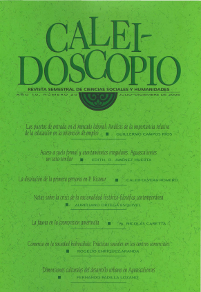The Ports of Entry into the Labor Market. Analysis of the relative importance of education in obtaining employment
DOI:
https://doi.org/10.33064/20crscsh355Keywords:
nput port, Work market, human capital, job, salaryAbstract
This work aims to show how are the just criticisms that in recent years have been raised against the theory of human capital, which has always maintained that the allocation of jobs and wages always depends on the amount of human capital each person. This article proposes a vision that recognizes a single market, making it relevant the high heterogeneity that exists within the market and that has generated the false impression of many markets. This proposal recovers the notion of "port of entry" as an intellectual device that allows us to better explain the evident contradictions that are reached in the analysis of the labor market based on any of the existing theoriesDownloads
Downloads
Published
How to Cite
Issue
Section
License
Licencia Creative Commons Atribución-NoComercial-CompartirIgual 4.0 Internacional
El lector es libre de compartir o adaptar el material en cualquier medio o formato bajo las condiciones siguientes: (a) debe reconocer adecuadamente la autoría, proporcionar un enlace a la licencia e indicar si se han realizado cambios; (b) no puede utilizar el material para una finalidad comercial y (c) si remezcla, transforma o crea a partir del material, deberá difundir sus contribuciones bajo la misma licencia que el original.
Resumen de la licencia
https://creativecommons.org/licenses/by-nc-sa/4.0/deed.es_ES
Texto completo de la licencia
https://creativecommons.org/licenses/by-nc-sa/4.0/legalcode
Cada autor es responsable del contenido de su artículo. En el caso de un texto colectivo, el primer autor asume la responsabilidad intelectual de los resultados del proceso editorial; los autores son responsables de obtener la licencia de autor para reproducir materiales gráficos o fotográficos que pertenecen a terceros.
Los autores asumen plena responsabilidad en el caso de falsificación de datos o falta de autenticidad en la investigación. Se comprometen, también, a no reutilizar trabajos ya publicados, total o parcialmente, para presentarlos en otra publicación.
Estas condiciones aplican tanto a la versión impresa como a la versión electrónica de la revista.


















